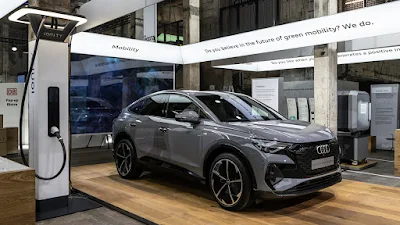Audi is the latest car brand to confirm that they will shed internal combustion engines and focus solely on full-electric powertrains. The decision was announced by Audi CEO Markus Duesmann.
The German luxury brand will end development of new internal combustion engine models by the end of 2026. After which the automaker will only develop battery-powered models.
That said, although Audi plans to stop production of new gasoline, diesel, and even hybrid cars, its new models launched by 2026 will continue to be built and sold until the early 2030s. After that time, Audi will become a purely electric car maker.
According to insiders, both the A3 and A4 will not have ICE successors, but will be replaced by the battery-powered A3 e-tron and A4 e-tron. The electric evolution of Audi’s A5 and A6 models will follow a similar trajectory.
The last internal combustion engine model built by Audi will likely be the Q8, which will launch in 2026 alongside an electric variant, the Q8 e-tron. The internal combustion engine Q8 will then be produced until 2032.
Previously, Audi announced plans to sell the A6 e-tron full-electric car alongside the standard A6 internal combustion engine models when it goes on sale in early 2023. A concept version of the A6 e-tron was unveiled at the Shanghai Auto Show last April. It had a range of over 700 kilometers, something which will be carried over to the production version.
It will be Audi’s second vehicle built on the PPE (premium platform electric) architecture developed with Porsche, following the Q6 e-tron large SUV due to be launched in the second half of 2022.
Audi plans to expand its full-electric lineup to 20 models globally by 2025. Audi and Volkswagen Group sister brand Porsche plan to sell 7 million cars based on the PPE platform by 2030.
Audi’s current full-electric cars are the e-tron, e-tron Sportback, and e-tron GT. The e-tron and e-tron Sportback are based on Audi’s MLB Evo platform while the e-tron GT shares its J1 platform with the Porsche Taycan.
Audi’s shift to electric-only goes further than its rival German luxury brands, BMW and Mercedes-Benz, which plan a more cautious switch to full electrification.
Mercedes said it would accelerate its shift to electric cars but provided no details of how fast its car lineup will go electric. On the other hand, BMW says it expects half of its sales to be fully-electric models by 2030.
The earliest premium carmaker to make the all-electric commitment is Jaguar which will become all battery-powered by 2025. Meanwhile, Volvo has committed to 2030. Bentley said it will drop internal combustion engines from its cars also by 2030, and switch its entire model range to full-electric vehicles.


No comments:
Post a Comment
Feel free to comment or share your views. Comments that are derogatory and/or spam will not be tolerated. We reserve the right to moderate and/or remove comments.